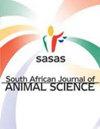饲粮中添加葱(Allium cepa)和姜(Zingiber officinale)减轻肉仔鸡热应激
IF 0.6
4区 农林科学
Q3 AGRICULTURE, DAIRY & ANIMAL SCIENCE
引用次数: 0
摘要
本试验旨在评价饲粮中添加葱(Allium cepa)和姜(Zingiber officinale)对热应激肉鸡生长、胴体品质、抗氧化能力和免疫反应的影响。试验选取700日龄哈伯德肉鸡进行称重,分为5个处理和5个重复。将肉鸡置于热中性(TN)环境或热应激(HS)环境。试验35 d,饲喂对照饲粮和3个水平的葱姜粉:5 g/kg生姜+ 1.5 g/kg洋葱(T1)、10 g/kg生姜+ 2.5 g/kg洋葱(T2)、15 g/kg生姜+ 3.5 g/kg洋葱(T3)。T2期体重、饲料系数(FCR)、屠宰率和免疫相关器官重量均较对照组改善。血液中丙二醛(MDA)和对氧磷酶-1 (PON1)浓度在T2明显高于对照组。同样,在同一饮食组,抗新城疫抗体滴度(ND)和总白细胞计数(TLC)均高于对照饮食。由此可见,饲粮中添加10 g生姜和2.5 g洋葱可提高热应激条件下肉鸡的生长性能、胴体品质、抗氧化能力和免疫反应。本文章由计算机程序翻译,如有差异,请以英文原文为准。
Mitigating heat stress in broiler chickens using dietary onion (Allium cepa) and ginger (Zingiber officinale) supplementation
The objective of this study was to evaluate the effect of dietary onion (Allium cepa) and ginger (Zingiber officinale) supplementation on growth, carcass quality, antioxidant status, and immune response in broilers under heat stress. A total of 700 day-old Hubbard broiler chicks were weighed and assigned to five treatments and five replicates. Broilers were maintained in a thermoneutral (TN) environment or were exposed to heat stress (HS). For 35 days, HS birds were fed a control diet and three levels of onion and ginger powder as: 5 g/kg ginger + 1.5 g/kg onion (T1), 10 g/kg ginger + 2.5 g/kg onion (T2), and 15 g/kg ginger + 3.5 g/kg onion (T3). Body weight, feed conversion ratio (FCR), dressing percentage, and the weight of immune-related organs improved in T2 compared to the control. Blood concentrations of malondialdehyde (MDA) and paraoxonase-1 (PON1) were substantially higher in T2 than the control. Similarly, in the same dietary group, the antibody titre against Newcastle disease (ND) and total leucocyte count (TLC) were greater than the control diet. The findings of this research indicate that 10 g of ginger combined with 2.5 g of onion in the diet enhance broiler growth performance, carcass quality, antioxidant status, and immunological response under heat stress conditions.
求助全文
通过发布文献求助,成功后即可免费获取论文全文。
去求助
来源期刊

South African Journal of Animal Science
农林科学-奶制品与动物科学
CiteScore
1.50
自引率
0.00%
发文量
39
审稿时长
>36 weeks
期刊介绍:
The South African Journal of Animal Science is an open access, peer-reviewed journal for
publication of original scientific articles and reviews in the field of animal science. The journal
publishes reports of research dealing with production of farmed animal species (cattle, sheep,
goats, pigs, horses, poultry and ostriches), as well as pertinent aspects of research on aquatic
and wildlife species. Disciplines covered nutrition, genetics, physiology, and production
systems. Systematic research on animal products, behaviour, and welfare are also invited.
Rigorous testing of well-specified hypotheses is expected.
 求助内容:
求助内容: 应助结果提醒方式:
应助结果提醒方式:


